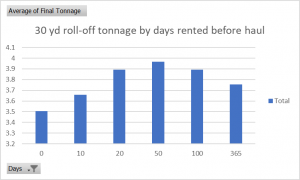There are a few factors that might be overlooked when determining a budget for a dumpster rental. Generally, the most important factors are the type of debris and amount. Are you throwing away cardboard, construction debris, or concrete? Obviously, the scale at the landfill is going to be friendlier with a dumpster full of cardboard than it will be with a load of concrete. Looking at data from thousands of roll-off hauls, I identified two factors which clearly affect the tonnage and the final price. First, are you a contractor or a DIY adventurer? Second, how long do you plan on taking to finish the project? Budgeting for a Roll-Off Dumpster
First, when a homeowner pays for a dumpster for construction debris, the average dumpster weighs half a ton more than the average construction roll-off. The DIY homeowner may be more price conscious and determined to get the most value out of the dumpster as possible. It is impossible to say the exact reason but our data clearly indicates that there is a measurable difference.

Need a Dumpster?
Speak with an account manager for a free quote.
As seen above, the amount of time a dumpster is on site before being hauled away can play a factor in the weight of the dumpster. It could be that individuals who rent a 30-yard roll-off for 21-50 days spend more time making sure that the dumpster is packed tightly before having it hauled away. In contrast, an individual who has a dumpster on site one day only may have decided that the benefit of compacting the trash is less valuable than the need to get the waste out of the way.
Whatever the reason for the differences above, it is necessary to take into consideration your habits and behaviors when determining your needs. Are you going to make sure that every square inch of space is occupied in the dumpster or is your priority speed? In either case, ZTERS is here to work with you to provide a dumpster that fits your needs.
